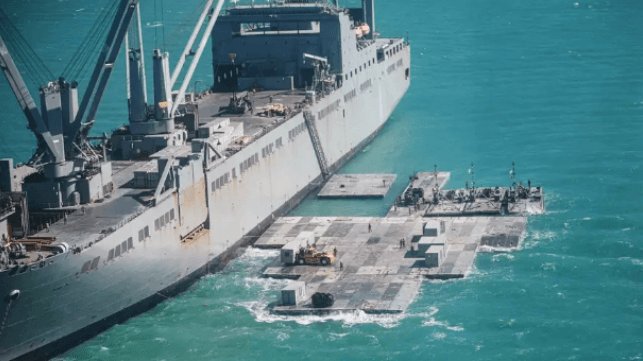Report: Gaza Aid Pier Project Comes Under Mortar Fire, Damaging Equipment

Shoreside construction operations for the U.S. maritime aid corridor to Gaza have come under mortar fire from Palestinian militants, Israeli sources told AP this week.
Israeli outlet i24 reports that the pier came under attack Wednesday while UN personnel were on scene, and that several pieces of equipment were damaged. One person suffered minor injuries, the outlet said.
"This was yesterday, a UN team was visiting the jetty and staging area for this proposed maritime operations. Two rounds came in, about 100m away. No injuries. They went into a bunker for some time and then continued the tour," a UN spokesman told i24. Aid personnel believe that the mortar fire was targeted at nearby Israeli troops, not at the aid operation, but there was collateral damage.
The U.S.-led operation plans to use a floating pier to conduct joint logistics over the shore (JLOTS) delivery of food aid from sealift ships. As Gaza has no significant port infrastructure, a joint U.S. Army / U.S. Navy team will install a floating modular causeway extending out from a beach in Gaza. Cargo will be offloaded from sealift ships onto a receiving barge further out at sea, transferred from the barge onto shallow-draft vessels, and delivered onto the floating causeway for final-mile trucking into the Gaza Strip.
The White House insists that no American forces will be involved in any shoreside components of this operation. For critics of the plan, the news that the construction activity has come under mortar fire raises new questions.
“This attack was unfortunate but predictable. This has been an ill-conceived mission from the start. Every day when these ships have been in transit was another day terrorists in Gaza have been preparing to thwart their arrival. In any case, the risk to Americans will only intensify. President Biden should never have put our men and women in this position, and he should abandon this project immediately before any U.S. troops are injured,” Senator Roger Wicker (R-MS) said in a statement.
A group of Republican senators, including wicker, previously warned of force-protection problems with the sealift plan. The terrorist group Hamas controlled Gaza for more than a decade, and has not yet been fully subdued by Israeli forces. The opportunity to attack American troops - even if those troops are delivering aid for the Palestinian people - could prove too attractive for Hamas' militants to pass up, the senators cautioned.

that matters most
Get the latest maritime news delivered to your inbox daily.
Aid groups have also questioned whether the maritime aid operation is necessary, since existing trucking routes can efficiently transfer all required aid - if allowed to cross into Gaza. Under heavy pressure from the White House, Israel has recently loosened restrictions on aid convoy crossings, allowing the UN and NGOs to address the risk of a deadly famine. UN officials have quietly raised concerns that the maritime aid operation could provide Israel with a political "smokescreen," allowing it to shut down border crossings and reduce overall aid flows. The maritime corridor has a planned capacity of 200 trucks a day, which is not enough by itself to replace the 500-truck daily volume desired by aid agencies.
The aid operation also sustained a logistical setback earlier this month when a sealift ship carrying floating-causeway components suffered an engine room fire. The vessel was forced to turn around mid-voyage and return to Florida. The timeline for its repair has not been announced, and Wicker's office described the vessel as "out of commission indefinitely."
